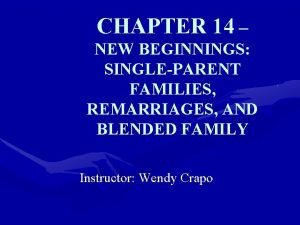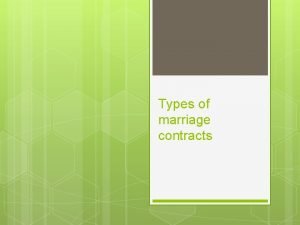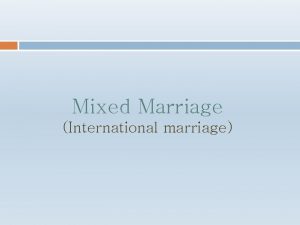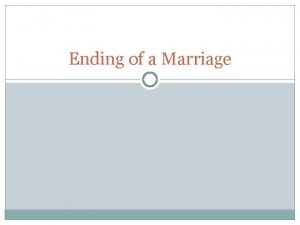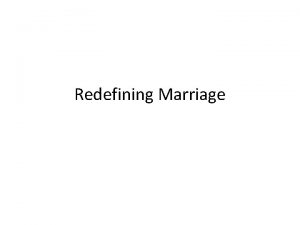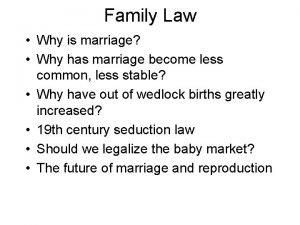Munnakahat The Law of Marriage Family Law The


















- Slides: 18

Munnakahat The Law of Marriage (Family Law)

The Purpose of Marriage: � Allah created men and women so that they can provide company to one another, love one another, procreate children and live in peace and tranquility to the commandments of Allah and the directions of His messenger. � The Qur’an says: “And among his signs is this, that he created for you mates from among yourselves, that you may dwell (live) in tranquillity with them, and he has put love and mercy between your hearts. Undoubtedly in there are signs for those who reflect. (Q. 30: 21). � And the Qur’an further says: “And Allah has made for your mates of your own nature and made for you, out of them sons and daughters, and grandchildren, and provide for you sustenance of the best”. (Q. 16: 72).

Celibacy is not considered a virtue in Islam or taken as a means of getting closer to Allah as is done by other religions like Christianity, Budhdism and Jainism. The prophet (SAW) has Advised: “O youngmen, whoever is able to marry, should marry, for that will help him to lower his gaze and guard his modesty”. In order to achieve modesty and complete one‘s iman, marriage is prescribed by the Prophet (SAW): “The Marriage is my tradition, whosoever keeps away therefrom, is not from amongst me”

The word Zawj, which in usage it connotes marriage, is used in the Qur’an as a pair or a mate: “Do they not look at the earth, how pairs of noble things we have produced therein”. “Among his signs is this, that he created for yor matters from among yourselves that you may dwell in (peace )with him”. “O mankind, heed (in reverence) your lord who created you from single soul and from it created its mate and from them twain both spread multitude of men&women”. (Q; 4: 1) The Prophett orders muslims to get married as soon as they can. The family is the nucleus of the islamic society & marriage is the only way to bring about such an institu tion. Extra-marital relations are categorically condemned & probihited

The System of Islmic Family Law Islam prescribes clear rights and obligations on parents and their descedants: parents are legally responsible for the education and maintenance of their children. These by turn, are legally responsible for accommodating and maintaning their parents, if they so require, in their old age. Both parents and children inherit from each other according to a prescribed and accurate law of Mirath (inheritance) specified in the Qur’an. Neither of them can deprive the other of their respective shares in the legacy. This is only one part of the long family code in Islam. What is of importance here is the husband-wife relationship their sex roles with the context of Islamic comprehension: “And among his signs is that He created for you mates from among yourselves, that you may dwell in peace with them. And he has put love and mercy between your hearts; Undoubtedly, in this are signs for those who reflect. (Q; 30: 21)

The Role of Man and Woman in Marriage According to Biological merits: - The man, with his aggression, is charged with what is called the “Instrumental” functions: maintenance, protection, dealings with the outwordly matters and leadership within the family. -The women is entrusted with caring for and rearing the children, organising the home, and creating the loving atmosphire inside her matrimonial home. in an islamic society the wife is not expected to be pushed to work to gain money. -- Even unmerried woman, the divorced woman and the widow are guaranted by law an income that helps them lead a reasonably comfortable life. -- Work or trade are not prohibited to woman in Shariah provided they do it within the framework of modesty and with the permission of the husband. - They are not recommended to undertake such activities unless there is a justification for them to go to work and should be without predjudice to their husband’s rights. Once functioning of the family. Her role becomes mainly to achieve them she has her own property or fortune& if she opts to run or invest such wealth she is entitled to do so without her husband’s permission, provided this does not infringe upon her marital obligations, and responsibilities to her children.

Therefore, marriage in Islam, broadly speaking, is: § § § A means of emotional and sexual gratifications A mechanism of tension reduction Social placement An approach to inter-family alliance and group solidarity An act of piety (Taqwah) It is a form of Ibadah, i. e. Worship of Allah and obedience of his Messenger. Both above definition and purposes are quite elaborate and comprise many views about functions of the family. Never - theless , there is an intricate cause and effect relationship between the family and society.

Is marriage Obligatory According to imams abu hanifah , Ahmad bin hanbal and Malik bin anas, although marriage in its origin may be deemed to be recommendatory, in cases of certain individuals, it becomes obligatory(Wajib). Howover, Imam Shafi’i considers marriage to be superogotery(Mubah). what emerges from a careful considerration of the Qur’ anic injunctions and the traditions of the prophet(SAW) is that marriage is compulsory(wajib) for a woman who has the means to easily pay(Mahr, Dower), and maintain a wife and children and who is healthy and fears that if he does not marry he may commit fornication(Zina). it is also compulsory for a women who has no other means of maintaining herself and fears that her sexual urge may push her into fornication. But it is recommendatory(mandub) for a person who has a strong will to control his sexual urge and not to fall prey to the evil temptations of shaitan but whose only aim is to have children. Howover, marriage is superogotory (Mubah or Naff)for a person who can control his sexual desire; who has no wish to have children and who feels that marriage will not keep him away from his devotion to Allah.

� � Howover according to the maliki school, it is obligatory (Fard) for a Muslim to marry even though he may not be in a position to earn is living on the following three conditions: 1. If he fears that by not marryng he will commit fornication (al-Zina) 2. If he is unable to fast to control his passion or that he can fast but his fasting doesnt help him to refrain from adultery 3. He cannot evev find a slave girl or an utterly poor girl to marry The hanafi school considers marriage obligatory on the following four conditions: 1. If a man is sure that he will commit Zina iof he did not marry 2. If he cannot fast, or even if fasts help him, he must fast rather than marry 3. If he cannot get a slave-girl to marry 4. If he is able to pay dower(Mahr), and is capable to earn lawful livelihood. If he is not capable to earn his livelihood lawfully, it is not obligatory for him to marry.

Marriage if forbidden(haram) to a man if he does not prosses the means to maintain his wife and children or if he suffers from an illness serious enough to affect his wife and his progeny. It is not desirable(Makruh) for a man who prossesses no sexual desire at all or who has no love for children , or who is sure to be slackened in his religious obligations as a resulet of marriage. The prophet(SAW)enjoined upon his followers to contract marriage because he had a definite object in view for them. There is a Hadith Which says: “It is narrated by anas(may Allah be pleased with him)that the messengers of Allah(SAW). Said: ”when a man marries he has fulfilled half of this religion, so let him fear Allah regarding the remaining half.

Selection Of Bride The prophet(SAW) recommended that in the selection of a bride , a man shall see before betrothal the intended bride lest a blunder in choice or an error in judgment should defect the very purpose of marriage. Howover, a man should not throw a passionate gaze at the would be bride but only have a critical look at her face and hands to gain sufficient idea about her personality and beauty. If man so desires he many appoint a woman to go, see& interview the would be bride, so that she could fully describe the type of woman she is. The special permission to have glance at the would be wife doesnt contravene the following code of condudt for believing men and woman: given in The holy qur’an: “tell the believing men to, lower their gaze and be modest. that is proper for them Lo! Allah is aware of what they do. (Q; 24: 30) “And tell believing woman to lower their gaze&the modest, and to display of their adornment only that which is apparent& to darw their veils over their bosom, and not to reveal their adornment save to their own husbands or fathers or husband’s father, or their sons/sisters, sons or their woman or their slaves or male attendants who lack vigour or children who know naught of woman’s nakedness&let them not stamp their feet so as to reveal what they hide of adorn ment. &turn unto Allah together O believes, in order that ye may succed (Q; 24: 31)

The choice of Partner and Power of Ijbar A. In no circumstances would the suitor and the would be bride be allowed to remain alone in aroom, because the Holy Prophet(SAW) says that whenever you leave a man and woman alone there is always a third person present and that is the shaitan. Except; after be marriage. B. The choice of partner by a muslim girl is subject to the overriding power of ijbar granted to her father or guardian under Maliki school. This a safety measure in the interest of the girl herself. Free Consent Of The Parties Marriage in reality is a. Mithaq meaning a solemn covenant or agreement between the husband wife which must be reduced to writing. They should agree in lawfull manner. As there can be no agreement, unless both partes give their consent of the two parties.

Prophet said: “The widow and the divorced woman shall not be married until he order or ordained, and the virgin shall not be married until her consent is obtained. and Bukhari’s next chapter is entitled thus: ”when a man gives his daughter in marriage and she dislikes it, the marriage shall be repudiated”, and hadith is quoted showing that the Holy Prophet repudiated such an marriage. A virgin girl came to the Holy Prophetand said that her father had her married against her whises, &the holy Prophet gave her the right to repudiate the marriage. The Holi Qur’an says; about widow: “And if any of you die&leave wives behind they bequeath thereby to their widows(the right to) one year’s maintenance without their being obliged to leave (the dead husband’s home), but if they leave(the resident)of their own accord there is no blame on you for whatever they do with themselves in a lawfull manner”. (Q; 2: 240)

Prohibited Degrees of Marriage The laws of Marriage have been so framed by the Shari’ah that they may help to establish an ideal Ummah. To this end the Qur’an and the Sunnah, have prescribed the prohibited degrees in marriage which can be divided into two categories: 1. The Permanently prohibited degrees are contained in (Surrah annisa: 22 -24). “and marry not those whom your fathers married, except what hath already happened(pf that nature) in the past. Lo! It was even lewdness and abomination; and en evil way. Forbidden unto you are your mothers, and your foster-sisters, and your mothers in law and your step daughters who are under your protection(born)of your woman unto whom you have gone in but if ye have not gone into them, then it is no sin for you(to marry their daughters).

1. From the above verses. it is clear that a muslim must not marry the following: 2. 3. 4. 5. 6. 7. 8. 9. 10. 11. 12. 13. 14. 15. His mother His step mother His grand mother(include father’s and motherr’s howsover high) His daughter(include the grand daughte i. e. sons or daughters howsover low His sister(including full, or consaguine & uterine, sisters) His father’s sister(including the grand father’s sister(S)) His mother sister(Including the grand mother’s sister(S)) His brother’s daughters His foster mother ‘s sister(s) His sister’s daughter(s) His foster sister His wife’s mother His step daughter: (such a daughter should have been born to his wife with whom he has consumated his relationship. His son’s wife: (this will not include wives of persons whom one treats as one’s adopted)

2. Temporary Probihitions Temporary probihitions are those which can be removed by a change of circumstances. They are follows: 1. A man must not marry two sisters in marriage at one and the same time. The temporary prohibition here gets removed as soon as, his wive dies& he takes her sister in marriage. This provision also applies to a man’s aunt as well as niece; 2. A man must not marry a married woman. But the impediment removed immediately on the dissolution of her marriage either by death of her husband or divorce followed by completion of the period of ‘iddah(retreat) 3. A man must not have more than four wives at a time. But the impediment is removed as soon as one of the wives dies or is divorced 4. A man must not marry a woman during her ‘iddah. But the impediment is removed as soon as the period of ‘iddah expires.

a. The qur’an says: ” but do not make a secret contract with them except in terms honourable, nor rescue on the tie of marriage till the term prescribed is fulfilled. (Q; 2: 235) b. The prophet(SAW) said: “A believer is a brother of a believer, hence it is not lawful for him to bargain upon the bargain of a brother ; nor propose(the hand of a girl) on the marriage proposal of his brother, until the latter(Voluntarily)withdraws the proposal. Imam abu hanifah, imam shafi’i&imam maliki hold the view that it is a sin to put a proposal on the proposal of a brother&if marriage is contracted it will suufice if the second suitor who was successfull seeks the forgiveness of the 1 st suitor&of Allah Conclusion: From the foregoing discussion it becomes clear that islam doesnt approve of celibacy&enjoins upon Muslims to get married. The purpose of marriage on islam, as we have sees, is not more carnal pleasure but the establishment of an instution whereby, man and woman may guard agaisnt lewdness and indecency, procreate children for preserving the human race and satisfying normal sexual urge for securing comfort and happiness.

� THANK YOU
 Usu marriage and family therapy
Usu marriage and family therapy Newton's first law and second law and third law
Newton's first law and second law and third law Newton's first law
Newton's first law Boyles law
Boyles law How to calculate boyle's law
How to calculate boyle's law Conjugal family
Conjugal family Varies from family to family on the periodic table
Varies from family to family on the periodic table Binuclear family vs blended family
Binuclear family vs blended family Hình ảnh bộ gõ cơ thể búng tay
Hình ảnh bộ gõ cơ thể búng tay Ng-html
Ng-html Bổ thể
Bổ thể Tỉ lệ cơ thể trẻ em
Tỉ lệ cơ thể trẻ em Chó sói
Chó sói Chụp tư thế worms-breton
Chụp tư thế worms-breton Chúa yêu trần thế alleluia
Chúa yêu trần thế alleluia Môn thể thao bắt đầu bằng chữ f
Môn thể thao bắt đầu bằng chữ f Thế nào là hệ số cao nhất
Thế nào là hệ số cao nhất Các châu lục và đại dương trên thế giới
Các châu lục và đại dương trên thế giới Công thức tính độ biến thiên đông lượng
Công thức tính độ biến thiên đông lượng







